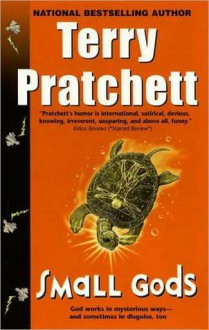
I can't believe that I am up to number 13 of the Discworld Books, but I guess that is not surprising since I am reading through them until I get to a point where I really don't want to read any more of them (since Pratchett still seems to be writing them for his die hard fans). I can't say that I am finding these books all that laugh out loud at this point in the series, however there is one thing that I can definitely say about Terry Pratchett and that is that he really knows how to end a book. Sure enough, the climax of this particular book is just as exciting as many of the other books of his that I have read. However, as I suggested, I suspect that many of his books are going to start going downhill from here.
In Small Gods Pratchett takes a satirical look at religion and philosophy, in particular the concept of monotheism. Basically a small god is a god that no longer has any worshippers and as such is stripped of all of its power. Om is almost at that particular point, except that he has one faithful believer, and that is a rather simple man name Burtha. However, ironically, the church of Om is quite powerful, it is just that they have ceased to worship Om the god and simply follow a bunch of rules and rituals that have been created by the priesthood over the centuries. Thus Om is in danger of becoming a small god.
The problem that I had with this book though is that while it is good as a fantasy story, as satire it simply does not work. The major religions of the world today are all monotheistic religions that stem from the same founder, that is Abraham. Granted we do have Hinduism, but I am disinclined to suggest that Buddhism, at its core, is a monothestic religion (it is more of an atheistic philosophy that attaches itself to other religions). Most of the polytheistic, or pantheistic religions, are generally in the minority (though they are still quite dominant in Asia, though they tend to be amalgamations of Buddhism). I suspect that if the major monotheistic religions (and the offshoots) were to be put into one category, we would find that they form a large majority of the world's population.
Therefore, satirising religion based upon the idea that a god's power is based upon the number of the god's followers simply does not work in a modern, or even in a post-modern, world, especially in such a society where the miraculous is no longer acknowledged.
However, putting aside the whole idea that I have discussed above, I think there are some very good points that Pratchett makes here, namely around the power of religion. What we see with the Omnians is the creation of a mono-culture, as they believe that not only their religion, but their form of worship and their rituals and practises are the only true way and thus they steam roll across the land destroying all forms of variety. They do not believe in making allies, or coming to agreements. It is a classic example of the bible and the gun.
Okay, I am a monotheist, and I also have a objective stance in regards to my faith, but that does not mean that everything is objective. Religion becomes dangerous when the subjective and the opinion are over-ridden by the objective, and that any form of independent thought is forbidden. I have been told that there is one particular off-shoot of Christianity where the guy at the top pretty much dictates what every adherent in the sect is supposed to read, preach, and talk about for that particular week, and there is no questioning those decrees. My response to that is 'what if that decree is wrong'. I have also seen it with regards to the attacks against Catholicism by certain evangelicals, yet in a discussion that I had last week, the only thing that we actually objected with regards to Catholicism was the deification of the saints. Pretty much every other aspect of Catholicism, when we actually think about it, is not all that offensive to evangelical Christianit – it is just that they do things a little differently to us, and in some cases, I actually think that they may do some things better than us.
It is the dogmatic attitude of some religions that Pratchett is satirising here, and we come across the conflict that this causes when the Omnians go to war against the Ephebians, which is the Discworld version of the Ancient Greeks. In a sense it is a clash against freedom of thought. What the dogmatic religion hates, and the reason that they hate it is because they fear it, is the ability to think for oneself and to question that which is around you. The reason they fear that is because freedom of thought actually gives us a form of freedom that nobody can take away. Once we begin to think for ourselves, and in doing so, begin questioning certain objective truths, the danger is that we may actually discover that these objective truths aren't actually objective, but rather relative, esoteric, or even little more than opinion. Once we begin to undermine those objective truths, the dogmatic leaders begin to lose power and, as was the case with Vorbis, end up being lost and alone.

 Log in with Facebook
Log in with Facebook 





